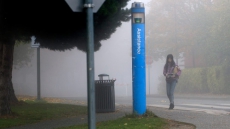GATINEAU, Que. — Canadians may want fast Internet access everywhere in the country but that doesn't mean it will be guaranteed by Canada's telecom regulator.
Canadian Radio-television and Telecommunications Commission chairman Jean-Pierre Blais says any speed or service level his agency finds ideal won't automatically mean regulatory action to ensure it's accessible to everyone.
Blais opened exhaustive hearings Monday into whether high-speed Internet access should be a basic service and what that could mean. But he said it will be up to participants to demonstrate why the CRTC should act and why market forces are not enough to ensure the public's need for Internet services is being met.
"As it is crucial not to confuse "wants" with "needs", the CRTC is asking parties to take a fact-based and objective approach to these discussions," Blais said in an opening statement to the hearings.
Since 2011, basic telecommunications services in Canada have been defined by the CRTC as touch-tone phone service, low-speed Internet, access to long distance, directory assistance, enhanced calling and privacy protection features, emergency services and voice mail.
The regulator also mandates that Canadians be provided with a printed version of their local phone book on request.
By the beginning of last year, 96 per cent of Canadians had access to the Internet at download speeds of at least 5 megabits per second, according to the CRTC.

About four per cent of the population — still hundreds of thousands of homes and businesses — had no access at those speeds.
Many cannot afford it, say advocacy groups.
A study released in February by ACORN Canada indicated many low-income Canadians are forced to choose between Internet services and putting food on the table or paying the rent.
"The Internet plays an important role in the everyday lives of low-income earners,” said the study.
"The high costs of obtaining high-speed home Internet connections can lead to unnecessary hardship," said the organization, which represents low- and moderate-income families and claims 70,000 members in nine cities.
The group wants the CRTC to mandate $10-per-month high-speed home Internet for families and individuals living below Statistics Canada's low income threshold, which in 2013 was set at $20,933 for an individual and $41,866 for a family of four, after taxes.
Some of the country's Internet service providers already offer service for $9.99 per month, on a limited basis, to low-income households.
Rogers Communications, Compugen and Microsoft Canada began offering the cut-rate high-speed Internet service in 2013 to some Toronto Community Housing units and Rogers since expanded availability to other parts of its service area.

Before the hearings began, the CRTC received more than 26,000 comments from individuals and businesses concerned about access to telecom services. More than 30,000 Canadians also answered a questionnaire on the subject.
The federal government's recent budget included money to improve the availability of broadband Internet in isolated communities.





